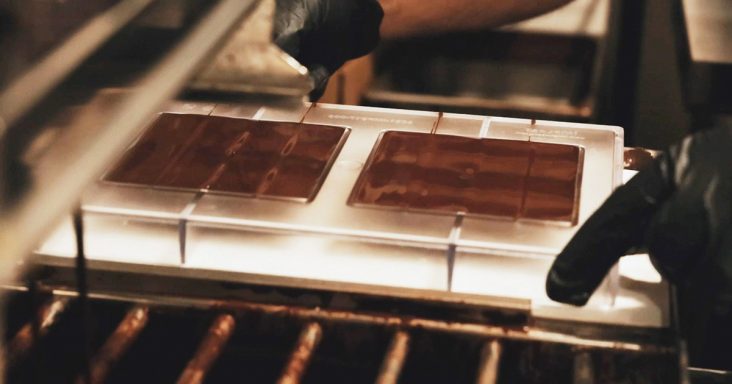Arkansas candy, chocolate makers weigh in on cocoa crunch
by April 4, 2024 11:29 am 972 views

Chocolate is formed into bars as part of bean-to-bar production for Onyx Coffee Lab in Rogers. Onyx, which makes Terroir Chocolate, purchases cocoa from the specialty market.
Cocoa prices recently hit record highs amid global supply concerns. Still, area chocolatiers and candy makers had different opinions about the impacts of lower supplies of the core ingredient used to make chocolate.
In February, multiple media outlets reported that cocoa prices soared as supply tightened. Reports attributed the El Nino phenomenon to drier weather, hurting crop yields in top-producing regions. Countries in West Africa account for three-quarters of global cocoa production. Cocoa is made from the seeds or beans of cacao trees.
“Headlines continue to reiterate the current global supply shortfall, and moreover, the ongoing seasonal intense Harmattan winds in West Africa are exacerbating the bullish prices situation,” according to the International Cocoa Organization’s Cocoa Market Review for January. “Since the start of the 2023/24 season, arrivals at Ivorian ports are estimated to be down by 34% year-on-year to 1.05 million (metric tons) as (of Feb. 4). In Ghana, graded and sealed cocoa purchases were down year-on-year by 35% to 351,000 (metric tons).”
The International Cocoa Organization projected global cocoa supply to fall by almost 11% to 4.44 million metric tons in the 2023/24 production season from the previous season. The season runs from October to September. A metric ton is about 2,204 pounds or 1.1 U.S. tons.
Cocoa future prices have ranged mainly between $2,000 and $3,000 per metric ton over the past two decades but started surging in January. Prices have risen over 60% since the start of 2024 and more than doubled from last year. Benchmark ICE cocoa futures exceeded $6,000 per metric ton for the first time in February. The price closed at $8,048 on March 12 but has since moderated to below $8,000. The price closed at $4,275 on Jan. 2. It closed at $2,884 on March 24, 2023.
CUTTING COSTS
Uriah Greer, co-owner of Martin Greer’s Candies, said that as prices have risen, the candy shop has found ways to reduce costs without passing them on to customers. The shop uses between 3 and 4 tons of chocolate annually. Martin Greer’s Candies is on U.S. Highway 62 between Rogers and Eureka Springs in northern Benton County.

“We have worked very hard to keep inflation out of our prices,” Greer said. “For that reason, we have not increased the base price of our products since the pandemic. We aim to keep that going because we care about the consumer.”
Greer said it might soon begin bean-to-bar chocolate production. Martin Greer’s Candies purchases pre-tempered chocolate about twice a year, typically in the fall and after the holidays. It melts the pre-tempered chocolate for candy dipping when making confections. He said if it starts bean-to-bar production, the shop can source cocoa from multiple countries, including outside countries facing the supply issues.
“We hope to start experimenting with it this year,” Greer said. “We’ve been researching it for a while and then hopefully roll out bean-to-bar products either late this year or sometime next spring or summer.”
Martin Greer’s Candies has been in business for 23 years. Its products include hand-dipped chocolates and candies cooked at the shop. Greer said his grandfather started making candy recipes dating back to the Civil War in the 1920s, and they’ve been improved upon over three generations. Greer and his brother and co-owner, Joshua Greer, operate the shop with seven part-time confectioners.
BROADER CHALLENGES
Lauren Blanco, co-founder and CEO of Markham & Fitz in Bentonville, said the bean-to-bar chocolate producer sources cocoa from outside of West Africa, but its supplier in the Dominican Republic has struggled with supply, too.

“They had a pretty extensive drought, and their crop exports are about 80% reduced,” she said. “It’s one of our biggest suppliers, so we’re actually feeling the impact of that already. We’re not getting beans as quickly as we usually do from that origin. We expect the price to increase, but we don’t know what the increase will look like yet.”
She added that Markham & Fitz buys cocoa at higher than market pricing “for a higher quality product.” The store orders cocoa by the pallet about every six to eight weeks. On average, each pallet has eight 150-pound bags or about 1,200 pounds. Its chocolate production capacity is about 29,000 pounds annually or more than 14 tons, but actual production is nearly 23,000 pounds or over 11 tons.
Blanco expects chocolate sales to be affected by the cocoa delays. The store has been unable to fill higher-volume wholesale orders because of the shortage. She noted that the shortage will affect business-to-business sales more than retail sales.
She said she doesn’t expect to raise product prices anytime soon. However, if cocoa prices were to remain higher for more than one season, product prices might be adjusted. She noted that the prices were increased about two years ago. Markham & Fitz has 12 staff.
PREMIUM PRICING
Preston Stewart, director of chocolate for Rogers-based Onyx Coffee Lab, expects cocoa prices to be higher the next time he purchases beans. Onyx makes bean-to-bar Terroir Chocolate using cocoa purchased from the specialty market. He noted that cocoa from West Africa is often purchased by large chocolate companies, such as The Hershey Co., Mars, Nestle and Cadbury owner Mondelez International.

As cocoa prices rise in the broader market, Stewart expects them to increase in the specialty market, too. “They’ll probably want to stay above it as like a premium product,” he said. “I imagine the next time we buy cocoa, we’ll see a jump.”
Stewart said Onyx works with U.S. suppliers that source cocoa from smaller cooperatives. Onyx uses a nearly 1-ton pallet about every six weeks and can produce about 10,000 chocolate bars in that period. Each bar is 2 ounces, so that’s 1,250 pounds of chocolate every six weeks. Spread over a year that would exceed 5 tons. Onyx also uses chocolate in confections, such as dark chocolate-covered espresso beans.
He said cocoa powder prices have increased by 20% since his last purchase. Onyx uses cocoa powder to make chocolate sauces for mochas and hot chocolates available at its cafes. He noted that cocoa butter prices have also increased recently.
Still, Stewart said he doesn’t expect to increase product prices unless high cocoa prices become the norm. Onyx’s chocolate sales have been steady, with Christmas and Valentine’s Day as the top two seasons for chocolate purchasing. The chocolate production team comprises two staff members. Onyx has about 200 employees.
